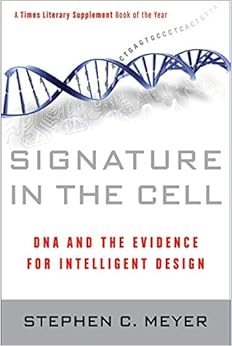 Recently, Trinity International University’s Henry Center’s online journal Sapientia asked, “Can Science Detect Intelligent Design? An Introduction,” sponsored by Hans Madueme.
Recently, Trinity International University’s Henry Center’s online journal Sapientia asked, “Can Science Detect Intelligent Design? An Introduction,” sponsored by Hans Madueme.
Design theorist Stephen C. Meyer, author of Signature in the Cell, replied at Evolution News & Science Today:
Where did the information in the cell come from? And how did the cell’s complex information processing system arise? These questions lie at the heart of contemporary origin-of-life research. Clearly, the informational features of the cell at least appear designed. And, as I show in extensive detail in my book Signature in the Cell, no theory of undirected chemical evolution explains the origin of the information needed to build the first living cell.
Why? There is simply too much information in the cell to be explained by chance alone. And attempts to explain the origin of information as the consequence of pre-biotic natural selection acting on random changes inevitably presuppose precisely what needs explaining, namely, reams of pre-existing genetic information. The information in DNA also defies explanation by reference to the laws of chemistry. Saying otherwise is like saying a newspaper headline might arise from the chemical attraction between ink and paper. Clearly something more is at work.
Yet, the scientists who infer intelligent design do not do so merely because natural processes — chance, laws, or their combination — have failed to explain the origin of the information and information processing systems in cells. Instead, we think intelligent design is detectable in living systems because we know from experience that systems possessing large amounts of such information invariably arise from intelligent causes. The information on a computer screen can be traced back to a user or programmer. The information in a newspaper ultimately came from a writer — from a mind. As the pioneering information theorist Henry Quastler observed, “Information habitually arises from conscious activity.”
This connection between information and prior intelligence enables us to detect or infer intelligent activity even from unobservable sources in the distant past. Archeologists infer ancient scribes from hieroglyphic inscriptions. SETI’s search for extraterrestrial intelligence presupposes that information imbedded in electromagnetic signals from space would indicate an intelligent source. Radio astronomers have not found any such signal from distant star systems; but closer to home, molecular biologists have discovered information in the cell, suggesting — by the same logic that underwrites the SETI program and ordinary scientific reasoning about other informational artifacts — an intelligent source.
DNA functions like a software program and contains specified information just as software does. More.
All true, of course, but one gets the feeling that it doesn’t matter. Faced with a choice, naturalists will simply revert to saying that the fact that it happened somehow shows that naturalism is true and anyway, consciousness is an illusion so there really is no intelligence behind any communication. Doubters don’t get their contracts renewed, which proves it.
See also: Theologian Hans Madueme on BioLogos’s Adam: A stumbling block to faith?
and
A classic in citation bluffing, in this case, to discredit Meyer’s Signature in the Cell